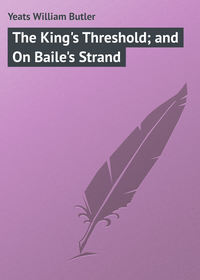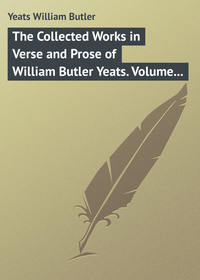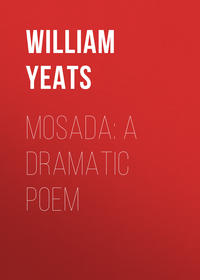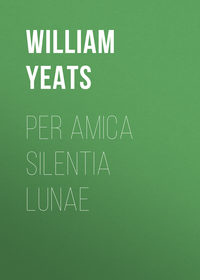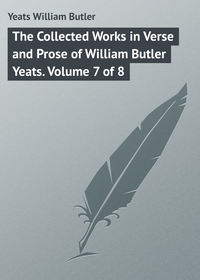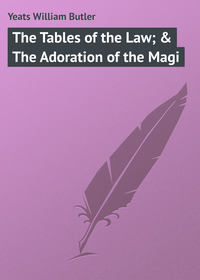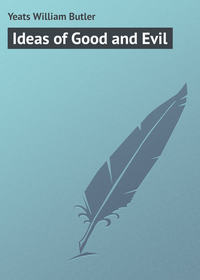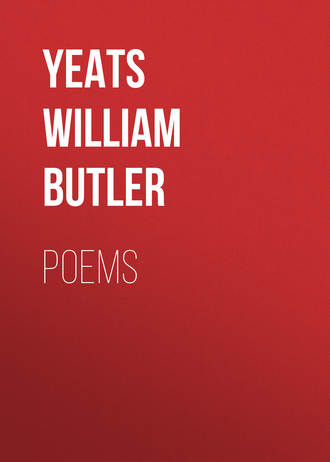 полная версия
полная версияPoems

W. B. Yeats
Poems
PREFACE
During the last year I have spent much time altering "The Countess Cathleen" and "The Land of Heart's Desire" that they might be a part of the repertory of the Abbey Theatre. I had written them before I had any practical experience, and I knew from the performance of the one in Dublin in 1899 and of the other in London in 1894 that they were full of defects. But in their new shape – and each play has been twice played during the winter – they have given me some pleasure, and are, I think, easier to play effectively than my later plays, depending less upon the players and more upon the producer, both having been imagined more for variety of stage-picture than variety of mood in the player. It was, indeed, the first performance of "The Countess Cathleen," when our stage-pictures were made out of poor conventional scenery and hired costumes, that set me writing plays where all would depend upon the player. The first two scenes are wholly new, and though I have left the old end in the body of this book I have given in the notes an end less difficult to producer and audience, and there are slight alterations elsewhere in the poem. "The Land of Heart's Desire," besides some mending in the details, has been thrown back in time because the metrical speech would have sounded unreal if spoken in a country cottage now that we have so many dialect comedies. The shades of Mrs. Fallan and Mrs. Dillane and of Dan Bourke and the Tramp would have seemed too boisterous or too vivid for shades made cold and distant with the artifice of verse.
I have not again retouched the lyric poems of my youth, fearing some stupidity in my middle years, but have changed two or three pages that I always knew to be wrong in "The Wanderings of Usheen."
W.B. YEATS.June, 1912.
PREFACE TO THE THIRD EDITION
I have added some passages to "The Land of Heart's Desire," and a new scene of some little length, besides passages here and there, to "The Countess Cathleen." The goddess has never come to me with her hands so full that I have not found many waste places after I had planted all that she had brought me. The present version of "The Countess Cathleen" is not quite the version adopted by the Irish Literary Theatre a couple of years ago, for our stage and scenery were capable of little; and it may differ more from any stage version I make in future, for it seems that my people of the waters and my unhappy dead, in the third act, cannot keep their supernatural essence, but must put on too much of our mortality, in any ordinary theatre. I am told that I must abandon a meaning or two and make my merchants carry away the treasure themselves. The act was written long ago, when I had seen so few plays that I took pleasure in stage effects. Indeed, I am not yet certain that a wealthy theatre could not shape it to an impressive pageantry, or that a theatre without any wealth could not lift it out of pageantry into the mind, with a dim curtain, and some dimly lighted players, and the beautiful voices that should be as important in poetical as in musical drama. The Elizabethan stage was so little imprisoned in material circumstance that the Elizabethan imagination was not strained by god or spirit, nor even by Echo herself – no, not even when she answered, as in "The Duchess of Malfi," in clear, loud words which were not the words that had been spoken to her. We have made a prison-house of paint and canvas, where we have as little freedom as under our own roofs, for there is no freedom in a house that has been made with hands. All art moves in the cave of the Chimæra, or in the garden of the Hesperides, or in the more silent house of the gods, and neither cave, nor garden, nor house can show itself clearly but to the mind's eye.
Besides rewriting a lyric or two, I have much enlarged the note on "The Countess Cathleen," as there has been some discussion in Ireland about the origin of the story, but the other notes are as they have always been. They are short enough, but I do not think that anybody who knows modern poetry will find obscurities in this book. In any case, I must leave my myths and symbols to explain themselves as the years go by and one poems lights up another, and the stories that friends, and one friend in particular, have gathered for me, or that I have gathered myself in many cottages, find their way into the light. I would, if I could, add to that majestic heraldry of the poets, that great and complicated inheritance of images which written literature has substituted for the greater and more complex inheritance of spoken tradition, some new heraldic images, gathered from the lips of the common people. Christianity and the old nature faith have lain down side by side in the cottages, and I would proclaim that peace as loudly as I can among the kingdoms of poetry, where there is no peace that is not joyous, no battle that does not give life instead of death; I may even try to persuade others, in more sober prose, that there can be no language more worthy of poetry and of the meditation of the soul than that which has been made, or can be made, out of a subtlety of desire, an emotion of sacrifice, a delight in order, that are perhaps Christian, and myths and images that mirror the energies of woods and streams, and of their wild creatures. Has any part of that majestic heraldry of the poets had a very different fountain? Is it not the ritual of the marriage of heaven and earth?
These details may seem to many unnecessary; but after all one writes poetry for a few careful readers and for a few friends, who will not consider such details unnecessary. When Cimabue had the cry it was, it seems, worth thinking of those that run; but to-day, when they can write as well as read, one can sit with one's companions under the hedgerow contentedly. If one writes well and has the patience, somebody will come from among the runners and read what one has written quickly, and go away quickly, and write out as much as he can remember in the language of the highway.
W.B. YEATS.January, 1901.
***THE COUNTESS CATHLEEN
"The sorrowful are dumb for thee"
Lament of Morion Shehone for Miss Mary BourkeTO MAUD GONNE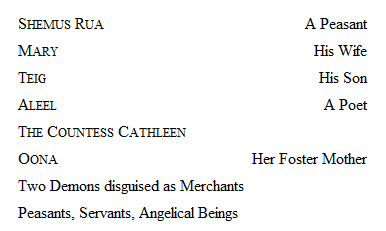
SCENE I
Scene. —A room with lighted fire, and a door into the open air, through which one sees, perhaps, the trees of a wood, and these trees should be painted in flat colour upon a gold or diapered sky. The walls are of one colour. The scent should have the effect of missal painting. Mary, awoman of forty years or so, is grinding a quern.
MARYWhat can have made the grey hen flutter so?(TEIG, a boy of fourteen, is coming in with turf, which he lays beside the hearth.)
TEIGThey say that now the land is famine struckThe graves are walking.MARYThere is something that the hen hears.TEIGAnd that is not the worst; at Tubber-vanachA woman met a man with ears spread out,And they moved up and down like a bat's wing.MARYWhat can have kept your father all this while?TEIGTwo nights ago, at Carrick-orus churchyard,A herdsman met a man who had no mouth,Nor eyes, nor ears; his face a wall of flesh;He saw him plainly by the light of the moon.MARYLook out, and tell me if your father's coming.(TEIG goes to door.)
TEIGMother!MARYWhat is it?TEIGIn the bush beyond,There are two birds – if you can call them birds —I could not see them rightly for the leaves.But they've the shape and colour of horned owlsAnd I'm half certain they've a human face.MARYMother of God, defend us!TEIGThey're looking at me.What is the good of praying? father says.God and the Mother of God have dropped asleep.What do they care, he says, though the whole landSqueal like a rabbit under a weasel's tooth?MARYYou'll bring misfortune with your blasphemiesUpon your father, or yourself, or me.I would to God he were home – ah, there he is.(SHEMUS comes in.)
What was it kept you in the wood? You knowI cannot get all sorts of accidentsOut of my mind till you are home again.SHEMUSI'm in no mood to listen to your clatter.Although I tramped the woods for half a day,I've taken nothing, for the very rats,Badgers, and hedgehogs seem to have died of drought,And there was scarce a wind in the parched leaves.TEIGThen you have brought no dinner.SHEMUSAfter thatI sat among the beggars at the cross-roads,And held a hollow hand among the others.MARYWhat, did you beg?SHEMUSI had no chance to beg,For when the beggars saw me they cried outThey would not have another share their alms,And hunted me away with sticks and stones.TEIGYou said that you would bring us food or money.SHEMUSWhat's in the house?TEIGA bit of mouldy bread.MARYThere's flour enough to make another loaf.TEIGAnd when that's gone?MARYThere is the hen in the coop.SHEMUSMy curse upon the beggars, my curse upon them!TEIGAnd the last penny gone.SHEMUSWhen the hen's gone,What can we do but live on sorrel and dock,And dandelion, till our mouths are green?MARYGod, that to this hour's found bit and sup,Will cater for us still.SHEMUSHis kitchen's bare.There were five doors that I looked through this dayAnd saw the dead and not a soul to wake them.MARYMaybe He'd have us die because He knows,When the ear is stopped and when the eye is stopped,That every wicked sight is hid from the eye,And all fool talk from the ear.SHEMUSWho's passing there?And mocking us with music?(A stringed instrument without.)
TEIGA young man plays it,There's an old woman and a lady with him.SHEMUSWhat is the trouble of the poor to her?Nothing at all or a harsh radishy sauceFor the day's meat.MARYGod's pity on the rich.Had we been through as many doors, and seenThe dishes standing on the polished woodIn the wax candle light, we'd be as hard,And there's the needle's eye at the end of all.SHEMUSMy curse upon the rich.TEIGThey're coming here.SHEMUSThen down upon that stool, down quick, I say,And call up a whey face and a whining voice,And let your head be bowed upon your knees.MARYHad I but time to put the place to rights.(CATHLEEN, OONA, and ALEEL enter.)
CATHLEENGod save all here. There is a certain house,An old grey castle with a kitchen garden,A cider orchard and a plot for flowers,Somewhere among these woods.MARYWe know it, lady.A place that's set among impassable wallsAs though world's trouble could not find it out.CATHLEENIt may be that we are that trouble, for we —Although we've wandered in the wood this hour —Have lost it too, yet I should know my way,For I lived all my childhood in that house.MARYThen you are Countess Cathleen?CATHLEENAnd this woman,Oona, my nurse, should have remembered it,For we were happy for a long time there.OONAThe paths are overgrown with thickets now,Or else some change has come upon my sight.CATHLEENAnd this young man, that should have known the woods —Because we met him on their border but now,Wandering and singing like a wave of the sea —Is so wrapped up in dreams of terrors to comeThat he can give no help.MARYYou have still some way,But I can put you on the trodden pathYour servants take when they are marketing.But first sit down and rest yourself awhile,For my old fathers served your fathers, lady,Longer than books can tell – and it were strangeIf you and yours should not be welcome here.CATHLEENAnd it were stranger still were I ungratefulFor such kind welcome – but I must be gone,For the night's gathering in.SHEMUSIt is a long whileSince I've set eyes on bread or on what buys it.CATHLEENSo you are starving even in this wood,Where I had thought I would find nothing changed.But that's a dream, for the old worm o' the worldCan eat its way into what place it pleases.(She gives money.)
TEIGBeautiful lady, give me something too;I fell but now, being weak with hunger and thirstAnd lay upon the threshold like a log.CATHLEENI gave for all and that was all I had.Look, my purse is empty. I have passedBy starving men and women all this day,And they have had the rest; but take the purse,The silver clasps on't may be worth a trifle.But if you'll come to-morrow to my houseYou shall have twice the sum.(ALEEL begins to play.)
SHEMUS (muttering)What, music, music!CATHLEENAh, do not blame the finger on the string;The doctors bid me fly the unlucky timesAnd find distraction for my thoughts, or elsePine to my grave.SHEMUSI have said nothing, lady.Why should the like of us complain?OONAHave done.Sorrows that she's but read of in a bookWeigh on her mind as if they had been her own.(OONA, MARY, and CATHLEEN go out. ALEEL looks defiantly at SHEMUS.)
ALEEL (singing)Were I but crazy for love's sakeI know who'd measure out his length,I know the heads that I should break,For crazy men have double strength.There! all's out now to leave or take,And who mocks music mocks at love;And when I'm crazy for love's sakeI'll not go far to choose.(Snapping his fingers in SHEMUS' face.)
Enough!I know the heads that I shall break.(He takes a step towards the door and then turns again.)
Shut to the door before the night has fallen,For who can say what walks, or in what shapeSome devilish creature flies in the air, but nowTwo grey-horned owls hooted above our heads.(He goes out, his singing dies away. MARY comes in. SHEMUS has been counting the money.)
SHEMUSSo that fool's gone.TEIGHe's seen the horned owls too.There's no good luck in owls, but it may beThat the ill luck's to fall upon his head.MARYYou never thanked her ladyship.SHEMUSThank her,For seven halfpence and a silver bit?TEIGBut for this empty purse?SHEMUSWhat's that for thanks,Or what's the double of it that she promised?With bread and flesh and every sort of foodUp to a price no man has heard the like ofAnd rising every day.MARYWe have all she had;She emptied out the purse before our eyes.SHEMUS (to MARY, who has gone to close the door)Leave that door open.MARYWhen those that have read books,And seen the seven wonders of the world,Fear what's above or what's below the ground,It's time that poverty should bolt the door.SHEMUSI'll have no bolts, for there is not a thingThat walks above the ground or under itI had not rather welcome to this houseThan any more of mankind, rich or poor.TEIGSo that they brought us money.SHEMUSI heard sayThere's something that appears like a white bird,A pigeon or a seagull or the like,But if you hit it with a stone or a stickIt clangs as though it had been made of brass,And that if you dig down where it was scratchingYou'll find a crock of gold.TEIGBut dream of goldFor three nights running, and there's always gold.SHEMUSYou might be starved before you've dug it out.TEIGBut maybe if you called, something would come,They have been seen of late.MARYIs it call devils?Call devils from the wood, call them in here?SHEMUSSo you'd stand up against me, and you'd sayWho or what I am to welcome here. (He hits her.)That is to show who's master.TEIGCall them in.MARYGod help us all!SHEMUSPray, if you have a mind to.It's little that the sleepy ears aboveCare for your words; but I'll call what I please.TEIGThere is many a one, they say, had money from them.SHEMUS (at door)Whatever you are that walk the woods at night,So be it that you have not shouldered upOut of a grave – for I'll have nothing human —And have free hands, a friendly trick of speech,I welcome you. Come, sit beside the fire.What matter if your head's below your armsOr you've a horse's tail to whip your flank,Feathers instead of hair, that's but a straw,Come, share what bread and meat is in the house,And stretch your heels and warm them in the ashes.And after that, let's share and share alikeAnd curse all men and women. Come in, come in.What, is there no one there? (Turning from door)And yet they sayThey are as common as the grass, and rideEven upon the book in the priest's hand.(TEIG lifts one arm slowly and points toward the door and begins moving backwards. SHEMUS turns, he also sees something and begins moving backward. MARY does the same. A man dressed as an Eastern merchant comes in carrying a small carpet. He unrolls it and sits cross-legged at one end of it. Another man dressed in the same way follows, and sits at the other end. This is done slowly and deliberately. When they are seated they take money out of embroidered purses at their girdles and begin arranging it on the carpet.)
TEIGYou speak to them.SHEMUSNo, you.TEIG'Twas you that called them.SHEMUS (coming nearer)I'd make so bold, if you would pardon it,To ask if there's a thing you'd have of us.Although we are but poor people, if there is,Why, if there is —FIRST MERCHANTWe've travelled a long road,For we are merchants that must tramp the world,And now we look for supper and a fireAnd a safe corner to count money in.SHEMUSI thought you were … but that's no matter now —There had been words between my wife and meBecause I said I would be master here,And ask in what I pleased or who I pleasedAnd so… but that is nothing to the point,Because it's certain that you are but merchants.FIRST MERCHANTWe travel for the Master of all merchants.SHEMUSYet if you were that I had thought but nowI'd welcome you no less. Be what you pleaseAnd you'll have supper at the market rate,That means that what was sold for but a pennyIs now worth fifty.(MERCHANTS begin putting money on carpet.)
FIRST MERCHANTOur Master bids us paySo good a price, that all who deal with usShall eat, drink, and be merry.SHEMUS (to MARY)Bestir yourself,Go kill and draw the fowl, while Teig and ILay out the plates and make a better fire.MARYI will not cook for you.SHEMUSNot cook! not cook!Do not be angry. She wants to pay me backBecause I struck her in that argument.But she'll get sense again. Since the dearth cameWe rattle one on another as though we wereKnives thrown into a basket to be cleaned.MARYI will not cook for you, because I knowIn what unlucky shape you sat but nowOutside this door.TEIGIt's this, your honours:Because of some wild words my father saidShe thinks you are not of those who cast a shadow.SHEMUSI said I'd make the devils of the woodWelcome, if they'd a mind to eat and drink;But it is certain that you are men like us.FIRST MERCHANTIt's strange that she should think we cast no shadow,For there is nothing on the ridge of the worldThat's more substantial than the merchants areThat buy and sell you.MARYIf you are not demons,And seeing what great wealth is spread out there,Give food or money to the starving poor.FIRST MERCHANTIf we knew how to find deserving poorWe'd do our share.MARYBut seek them patiently.FIRST MERCHANTWe know the evils of mere charity.MARYThose scruples may befit a common time.I had thought there was a pushing to and fro,At times like this, that overset the scaleAnd trampled measure down.FIRST MERCHANTBut if alreadyWe'd thought of a more prudent way than that?SECOND MERCHANTIf each one brings a bit of merchandise,We'll give him such a price he never dreamt of.MARYWhere shall the starving come at merchandise?FIRST MERCHANTWe will ask nothing but what all men have.MARYTheir swine and cattle, fields and implementsAre sold and gone.FIRST MERCHANTThey have not sold all yet.For there's a vaporous thing – that may be nothing,But that's the buyer's risk – a second self,They call immortal for a story's sake.SHEMUSThey come to buy our souls?TEIGI'll barter mine.Why should we starve for what may be but nothing?MARYTeig and Shemus —SHEMUSWhat can it be but nothing?What has God poured out of His bag but famine?Satan gives money.TEIGYet no thunder stirs.FIRST MERCHANTThere is a heap for each.(SHEMUS goes to take money.)
But no, not yet,For there's a work I have to set you to.SHEMUSSo then you're as deceitful as the rest,And all that talk of buying what's but a vapourIs fancy bread. I might have known as much,Because that's how the trick-o'-the-loop man talks.FIRST MERCHANTThat's for the work, each has its separate price;But neither price is paid till the work's done.TEIGThe same for me.MARYOh, God, why are you still?FIRST MERCHANTYou've but to cry aloud at every cross-road,At every house door, that we buy men's souls.And give so good a price that all may liveIn mirth and comfort till the famine's done,Because we are Christian men.SHEMUSCome, let's away.TEIGI shall keep running till I've earned the price.SECOND MERCHANT(who has risen and gone towards fire)
Stop; you must have proof behind the words.So here's your entertainment on the road.(He throws a bag of money on the ground.)
Live as you please; our Master's generous.(TEIG and SHEMUS have stopped. TEIG takes the money. They go out.)
MARYDestroyers of souls, God will destroy you quickly.You shall at last dry like dry leaves and hangNailed like dead vermin to the doors of God.SECOND MERCHANTCurse to your fill, for saints will have their dreams.FIRST MERCHANTThough we're but vermin that our Master sentTo overrun the world, he at the endShall pull apart the pale ribs of the moonAnd quench the stars in the ancestral night.MARYGod is all powerful.SECOND MERCHANTPray, you shall need Him.You shall eat dock and grass, and dandelion,Till that low threshold there becomes a wall,And when your hands can scarcely drag your bodyWe shall be near you.(MARY faints.)
(The FIRST MERCHANT takes up the carpet, spreads it before the fire and stands in front of it warming his hands.)
FIRST MERCHANTOur faces go unscratched,Wring the neck o' that fowl, scatter the flourAnd look if there is bread upon the shelves.We'll turn the fowl upon the spit and roast it,And eat the supper we were bidden to,Now that the house is quiet, praise our Master,And stretch and warm our heels among the ashes.END OF SCENE ISCENE II
FRONT SCENE. —A wood with perhaps distant view of turreted house at one side, but all in flat colour, without light and shade and against a diapered or gold background.
COUNTESS CATHLEEN comes in leaning upon ALEEL'S arm. OONA follows them.
CATHLEEN (stopping)Surely this leafy corner, where one smellsThe wild bee's honey, has a story too?OONAThere is the house at last.ALEELA man, they say,Loved Maeve the Queen of all the invisible host,And died of his love nine centuries ago.And now, when the moon's riding at the full,She leaves her dancers lonely and lies thereUpon that level place, and for three daysStretches and sighs and wets her long pale cheeks.CATHLEENSo she loves truly.ALEELNo, but wets her cheeks,Lady, because she has forgot his name.CATHLEENShe'd sleep that trouble away – though it must beA heavy trouble to forget his name —If she had better sense.OONAYour own house, lady.ALEELShe sleeps high up on wintry Knock-na-reaIn an old cairn of stones; while her poor womenMust lie and jog in the wave if they would sleep —Being water born – yet if she cry their namesThey run up on the land and dance in the moonTill they are giddy and would love as men do,And be as patient and as pitiful.But there is nothing that will stop in their headsThey've such poor memories, though they weep for it.Oh, yes, they weep; that's when the moon is full.CATHLEENIs it because they have short memoriesThey live so long?ALEELWhat's memory but the ashThat chokes our fires that have begun to sink?And they've a dizzy, everlasting fire.OONAThere is your own house, lady.CATHLEENWhy, that's true,And we'd have passed it without noticing.ALEELA curse upon it for a meddlesome house!Had it but stayed away I would have knownWhat Queen Maeve thinks on when the moon is pinched;And whether now – as in the old days – the dancersSet their brief love on men.OONARest on my arm.These are no thoughts for any Christian ear.ALEELI am younger, she would be too heavy for you.(He begins taking his lute out of the bag, CATHLEEN, who has turned towards OONA, turns back to him.)


